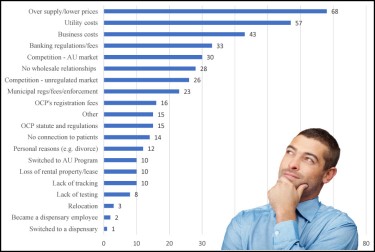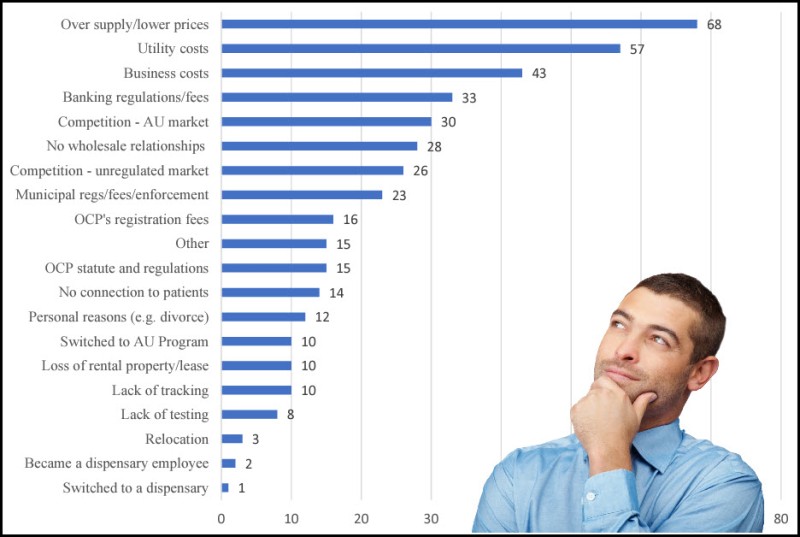Want to know why the marijuana industry is failing? Just look to Maine, a relatively knew East Coast state that is seeing massive systemic failures in their medical cannabis program. Maine has lost more than 1,350 Medical Cannabis Caregivers Since 2021, and that is just caregivers are admitting to on a survey.
Between the end of 2021 and the end of January 2023, more than 1350 caregivers left the Maine Medical Use of Cannabis Program (MMCP), resulting in a net loss of over 800 caregivers. This departure has affected the remaining caregivers, leading to several unverified claims about the reasons for this trend and why caregivers are still leaving the program.
In early 2023, the Office of Cannabis Policy (OCP) surveyed former caregivers to determine why many registrants had left the program. Instead of relying on anecdotal evidence, the survey aimed to provide a more accurate understanding of the situation. The results indicated market and business conditions were the primary reasons for program exits.
A Significant Setback
The reduction in medical cannabis caregivers amounted to 27.5% of the program's participants. This decrease has been a significant setback for the program. Both insiders and outsiders have made speculations about the reasons behind these changes.
The OCP has aimed to collect data and analyze the discussion while gaining a more comprehensive understanding of the policy implications of the caregiver program. To investigate this issue more systematically, the OCP has created a survey to analyze the reasons behind caregiver departures from the program.
A survey was conducted by emailing every caregiver who left the program between January 1, 2022, and January 31, 2023, with 1339 individuals being successfully contacted. Only 14 former caregivers did not have a valid email address on file. The OCP received responses from 117 former caregivers over several weeks, representing a reply rate of 8.7%.
While the survey responses were anonymous, the respondents could provide their contact information at the end of the survey. This is if they were willing to be contacted by the OCP for potential future follow-up.

Survey Results
The OCP received responses from individuals who had previously participated in authorized conduct in six categories. The majority of respondents, comprising 71.7%, were involved in cultivating cannabis for direct sales or wholesale. This outcome is not surprising for two reasons: firstly, because these two activities are the most common among caregivers in the program.
Secondly, the price of cannabis in the MMCP has significantly declined due to the rise in production. Cultivators are more susceptible to market effects, making participants from those groups more likely to leave the MMCP. Therefore, finding a higher percentage of cultivators among the survey respondents is reasonable.
The OCP conducted the survey's design, implementation, and internal data collection and analysis. According to the OCP's definition, an individual is considered to have exited the program if they allowed their caregiver registration to expire, did not renew it, or voluntarily withdrew. The survey responses were collected between February 17, 2023, and March 17, 2023.
Among former caregivers, the top five most common responses were as follows:
-
An oversupply of products resulting in lower prices,
-
Business costs
-
Utility costs
-
Banking fees and regulations
-
Competition with the recreational market.
The combined responses to these five factors accounted for 54.5% of the 424 total responses received. Of the 117 respondents, 68 (58.1%) selected an oversupply of products resulting in lower prices as one of the top five issues. In contrast, 57 (48.7%) selected utility costs as one of their top five reasons for leaving the program.
These findings sharply contrast with the speculation and rumours regarding what has occurred within the MMCP. Some unverified claims focus on caregivers' dissatisfaction with the OCP's program regulation. The data indicates that a significantly smaller number of individuals hold this perspective. Only 16 (13.7%) respondents identified OCP's registration fees as a top five reason for exiting the program. Likewise, only 15 (12.8%) respondents identified OCP's statute and regulations as a top five reason. These two answers combined only accounted for 7.3% of all responses.
Feedback from Former Caregivers
The survey had an open-ended section allowing former caregivers to provide their reasons for leaving. This provides the benefit of hearing from a diverse range of opinions outside the usual ones the legislature hears from the medical community. While the voices of medical patients and caregivers are essential, the OCP also values input from those in the medical industry who may need to be more vocal on public platforms. Some former caregivers have expressed a need for more interest in participating in such discussions.
Some respondents have reported that they or people they know have faced harassment or economic and physical intimidation, which makes them unwilling to speak publicly. As a result, they have expressed their disinterest in participating in public platforms. OCP staff often receive comments and concerns from medical and adult use program participants who prefer to remain anonymous.
The survey's purpose was to create a space for former caregivers to express their thoughts without revealing their identity, even to OCP. This process allowed for unedited feedback, including some critical remarks about OCP. However, criticism was not solely directed at the government. Five key areas of concern emerged, which align with the responses to the survey questions: lack of profit/overproduction, out-of-state companies and money, the success of the recreational market, bias toward giant businesses, and lack of cooperation from caregivers/illegal operations. It is worth mentioning that some respondents provided answers that addressed issues in multiple categories.
One concerning discovery from some responses was that a few respondents were willing to engage in illegal activities. For instance, one respondent stated that "The industry is not profitable. I would rather sell weed on the street. At least I would make 7.25/hour." Another respondent expressed, "I would rather sell it illegally and make money than have to pay to not even be allowed to open a store."
One eyebrow raising reason that MMJ providers cited in the survey was cannabis coming in from other states is creating an oversupply issue. This should stun the industry as Maine is bordered by the Atlantic Ocean, New Hampshire, and Massachusetts. Maine is a very poor state when you get off the ocean and a few lakes, so the fact that out-of-state cannabis is making its way to Maine and UNDERCUTTING their black market prices is shocking and should be a wake up call for the cannabis industry. If Maine is having issues with out-of-state cannabis, and it is already has low cost options within state lines, then how "cheap is cheap" right now in the cannabis industry?
If you read Cananbis.net's analysis of black market prices compared to legal market prices, you will see some products are 95% cheaper already on the black market. How can a low-cost state like Maine be "beat on price" by out-of-state weed? That shows that rock bottom prices are lower than most analyst think right now.
Conclusion
In the end, the survey of former caregivers offers essential insights and a more comprehensive comprehension of the pressures affecting MMCP operators. The primary factors behind the decision of caregivers to leave the program are related to market and business conditions. The significant oversupply of cannabis and the subsequent drop in prices has had a devastating impact, especially with the rising energy costs during the departure.
This finding contradicts other speculations about the reasons for the caregivers' departure from the program, such as overly strict state regulations or high registration fees.
THE RACE TO THE BOTTOM IS NOT OVER, READ ON...
THE BLACK MARKET IS ________ CHEAPER THAN THE LEGAL CANNABIS MARKET?






